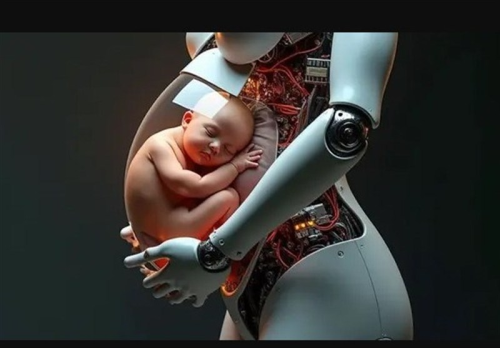In a major development poised to reshape reproductive science and ignite a global ethical debate, Chinese scientists are on track to unveil a humanoid robot equipped with a fully functional artificial womb. The technology, which proponents suggest could offer a viable and affordable alternative to traditional surrogacy, is being developed by Kaiwa Technology and is spearheaded by company founder, Dr. Zhang Qifeng.
The project aims to integrate an artificial womb into the abdomen of a humanoid robot, capable of supporting a human fetus from conception through a full-term pregnancy and delivery . According to Dr. Zhang, the artificial womb system is designed to closely mimic natural gestation, utilizing synthetic amniotic fluid and a tube-based nutrient delivery system to sustain the developing fetus. The core technology, he claims, is already at a “mature stage,” with the next phase focusing on integration into the robot’s body to enable “human-robot interaction” during the pregnancy process.
Kaiwa Technology has set an ambitious target to debut a working prototype by 2026. The expected price point is approximately $14,000 (around 100,000 yuan), which would make the technology significantly more accessible than many commercial surrogacy arrangements globally.
The announcement has triggered intense public and expert discussion regarding the profound ethical, legal, and societal implications of a machine-based pregnancy.
Ethical Concerns: Critics raise serious questions about the nature of the maternal-fetal bond, the psychological well-being of children born without traditional gestation, and the potential commodification of childbirth. Some feminist voices also caution that such a technology could undermine the role of motherhood and further marginalize women in society.
Regulatory Discussions: Recognizing the magnitude of the social change this technology could bring, Dr. Zhang Qifeng confirmed he is already engaged in discussions with Guangdong Province authorities regarding the necessary regulatory and policy frameworks. Debates are reportedly underway to address complex issues, including the legal definition of parenthood and the rights of a child born through robotic gestation.
While the project promises a revolutionary path for couples facing rising infertility rates—a significant issue in China—experts caution that replicating the intricate biological and hormonal processes of human pregnancy remains a massive scientific challenge. The development pushes the boundaries of robotics and reproductive medicine, challenging fundamental definitions of life, family, and humanity.







